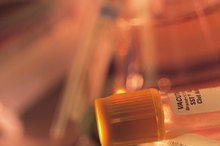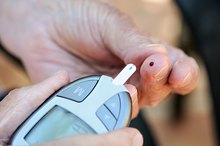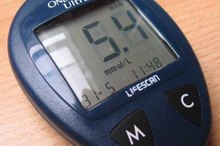High Liver Enzymes, Fasting and Blood Tests
When your body stores too much iron, your liver may be affected and release certain enzymes into your bloodstream. Your health-care provider may wish to test your blood for any or all of several liver enzymes or for various indicators of your iron levels. This blood work may reveal a need for further tests, some of which may require advance preparation by the donor. Fasting for several hours or overnight is commonly requested to ensure that your blood sample reflects your normal blood chemistry.
Reasons to Test Liver Enzymes
Iron-deficiency anemia, a condition of low blood count due to low iron levels, and hemochromatosis, a condition of iron overload, both signal that the body is abnormally processing dietary iron 1. Underlying causes may be related to diet, blood loss, medication interaction or physical malfunction. Your doctor can use blood tests to assist in diagnosing the source of unusual iron or liver enzyme blood levels.
Your Blood Test
Is It Okay to Drink Coffee Before a Metabolic Panel Blood Test?
Learn More
Depending on your health condition, the blood sample that you will provide may be tested specifically for liver function in a group of tests called a liver panel. Your health-care provider may also wish to evaluate other factors in your blood and organs and request a battery of tests that includes liver function assessment and blood glucose analysis in a comprehensive metabolic panel 4. You may be asked to give a single blood specimen or to provide one after fasting and one without fasting. Your doctor will let you know which process you will undergo.
- Depending on your health condition, the blood sample that you will provide may be tested specifically for liver function in a group of tests called a liver panel.
- Your health-care provider may also wish to evaluate other factors in your blood and organs and request a battery of tests that includes liver function assessment and blood glucose analysis in a comprehensive metabolic panel 4.
Fasting Directions
You may be asked to fast for 10 to 12 hours before giving blood for testing. The typical fast restricts your diet to water only during that time. If, among your combined tests, some do and some don’t require fasting, you will need to fast so that the overall outcome will be accurate. Because rules may differ among testing laboratories, follow the guidelines provided by your doctor or the lab itself, or request help if you need it.
- You may be asked to fast for 10 to 12 hours before giving blood for testing.
- Because rules may differ among testing laboratories, follow the guidelines provided by your doctor or the lab itself, or request help if you need it.
Your Blood Sample
Fasting Blood Tests & Black Coffee
Learn More
Your adherence to fasting will determine how quick and precise the assessment of your blood specimen will be. If you eat or drink any substances other than water beforehand, you may have to reschedule the test and start over. To deliver the best possible blood sample, be sure to avoid consuming solid foods, juice, coffee, tea, soda, alcohol, candy, gum or any other foods or beverages.
Related Articles
References
- National Heart Lung and Blood Institute; Iron-Deficiency Anemia; April 2011
- NHLBI; Hemochromatosis; February 2011
- American Association for Clinical Chemistry; Liver Panel; June 2011
- AACC; Comprehensive Metabolic Panel; April 2011
- Gafter-gvili A, Schechter A, Rozen-zvi B. Iron Deficiency Anemia in Chronic Kidney Disease. Acta Haematol. 2019;142(1):44-50. doi:10.1159/000496492
- Iron-Deficiency Anemia. National Heart Lung and Blood Institute.
- Coad J, Pedley K. Iron deficiency and iron deficiency anemia in women. Scand J Clin Lab Invest Suppl. 2014;244:82-9. doi:10.3109/00365513.2014.936694
- Hung N, Shen CC, Hu YW, et al. Risk of cancer in patients with iron deficiency anemia: a nationwide population-based study. PLoS ONE. 2015;10(3):e0119647. doi:10.1371/journal.pone.0119647
- Nemeth E, Ganz T. Anemia of inflammation. Hematol Oncol Clin North Am. 2014;28(4):671-81, vi. doi:10.1016/j.hoc.2014.04.005
- Koperdanova M, Cullis JO. Interpreting raised serum ferritin levels. BMJ. 2015;351:h3692. doi:10.1136/bmj.h3692
- Ferritin blood test: MedlinePlus Medical Encyclopedia. MedlinePlus. Nov 6, 2019.
- Daru J, Allotey J, Peña-rosas JP, Khan KS. Serum ferritin thresholds for the diagnosis of iron deficiency in pregnancy: a systematic review. Transfus Med. 2017;27(3):167-174. doi:10.1111/tme.12408
- Nairz M, Theurl I, Wolf D, Weiss G. Iron deficiency or anemia of inflammation? : Differential diagnosis and mechanisms of anemia of inflammation. Wien Med Wochenschr. 2016;166(13-14):411-423. doi:10.1007/s10354-016-0505-7
- Iron Tests. American Association for Clinical Chemistry.
- Adamson JW. Iron Deficiency and Other Hypoproliferative Anemias. In: Longo DL, Fauci AS, Kasper DL, et al, eds. Harrison’s Principles of Internal Medicine.18th ed. New York, NY: McGraw Hill; 2011: 844-851.
- Daru J, Colman K, Stanworth SJ, et al. Serum ferritin as an indicator of iron status: what do we need to know? Am J Clin Nutr. 2017;106(Suppl 6):1634S-1639S. DOI: 10.3945/ajcn.117.155960
- Halland M, de Malmanche J. Interpretation of iron studies: a practical approach. Medicine Today. 2011; 12(7) 65-66.
- Wang W, Knovich MA, Coffman LG, et al. Serum ferritin: past, present and future. Biochim Biophys Acta. 2010;1800(8):760-9. DOI:10.1016/j.bbagen.2010.03.011
Writer Bio
Nancy Clarke began writing in 1988 after achieving her Bachelor of Arts in English and has edited books on medicine, diet, senior care and other health topics. Her related affiliations include work for the American Medical Association and Oregon Health Plan.









